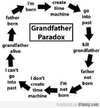What thought experiements amuse you or provide you with insight?
can you share here?
one thought experiment i find interesting is the happy pill prison experiment. Not so much because its well thought out but mostly because all philosophers seem to get the answer wrong.
happy pill prison thought experiment:
Would you rather be locked in a cage for your whole life where you would be given a pill each day that would guarantee to make your life happier than the alternative where you are free to live your life as you please out in the real world? Or would you choose freedom in the real world despite it being guaranteed to provide you with less happiness?
Most philosophers answer that everyone would reject the cage and choose freedom and then argue that this answer is proof that happiness is not the goal of life. They claim this prooves utilitarinism is wrong. I argue they are wrong. Happiness is the goal of life and we should take the cage option. Now why do i think they get the answer wrong?
Because everything else we are told about the experiment implies the cage choice is the unhappy outcome and we fail to grasp the true meaning of what the happiness pill is. Cages take away our freedom and our potential to find meaning in the external world. who would want this? However, the reason these things are bad is solely because they create unhappiness, which we are told the pill more then compensates for. We confuse means with an end. We struggle to understand the greatness of the pill.
We also assume, despite being told otherwise, that taking the freedom option has the potential to provide us with more happiness because in reality our happiness is not pre determined but a function of what happens to us. Our subconciousness struggles to rationalize the outcome of the experiement with the settings provided because they dont make logical sense in reality.
for these reasons I think the philosophers are wrong in their conclusions for this experiement.
thoughts? Do you have other thought experiments to share?
can you share here?
one thought experiment i find interesting is the happy pill prison experiment. Not so much because its well thought out but mostly because all philosophers seem to get the answer wrong.
happy pill prison thought experiment:
Would you rather be locked in a cage for your whole life where you would be given a pill each day that would guarantee to make your life happier than the alternative where you are free to live your life as you please out in the real world? Or would you choose freedom in the real world despite it being guaranteed to provide you with less happiness?
Most philosophers answer that everyone would reject the cage and choose freedom and then argue that this answer is proof that happiness is not the goal of life. They claim this prooves utilitarinism is wrong. I argue they are wrong. Happiness is the goal of life and we should take the cage option. Now why do i think they get the answer wrong?
Because everything else we are told about the experiment implies the cage choice is the unhappy outcome and we fail to grasp the true meaning of what the happiness pill is. Cages take away our freedom and our potential to find meaning in the external world. who would want this? However, the reason these things are bad is solely because they create unhappiness, which we are told the pill more then compensates for. We confuse means with an end. We struggle to understand the greatness of the pill.
We also assume, despite being told otherwise, that taking the freedom option has the potential to provide us with more happiness because in reality our happiness is not pre determined but a function of what happens to us. Our subconciousness struggles to rationalize the outcome of the experiement with the settings provided because they dont make logical sense in reality.
for these reasons I think the philosophers are wrong in their conclusions for this experiement.
thoughts? Do you have other thought experiments to share?





